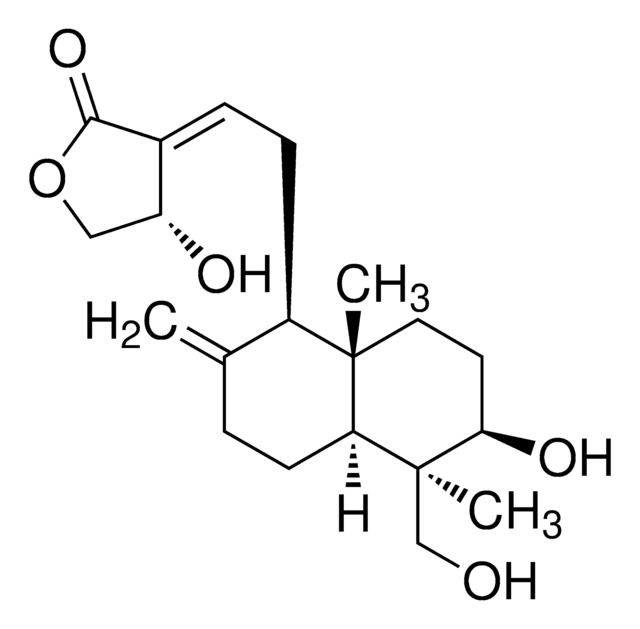W382108
3-Carene
≥90%
Synonym(s):
δ3-Carene, 3,7,7-Trimethylbicyclo[4.1.0]hept-3-ene
About This Item
Recommended Products
biological source
synthetic
Quality Level
Assay
≥90%
refractive index
n20/D 1.474 (lit.)
bp
168-169 °C/705 mmHg (lit.)
density
0.857 g/mL at 25 °C (lit.)
application(s)
flavors and fragrances
Documentation
see Safety & Documentation for available documents
food allergen
no known allergens
Organoleptic
citrus; sweet
SMILES string
CC1=CCC2C(C1)C2(C)C
InChI
1S/C10H16/c1-7-4-5-8-9(6-7)10(8,2)3/h4,8-9H,5-6H2,1-3H3
InChI key
BQOFWKZOCNGFEC-UHFFFAOYSA-N
Looking for similar products? Visit Product Comparison Guide
Related Categories
General description
Application
- Identification and quality evaluation of Lushan Yunwu tea from different geographical origins based on metabolomics.: The presence of 3-carene in Lushan Yunwu tea is studied for its impact on tea quality and flavor profile, providing insights into the metabolomic distinctions influenced by geographical factors (Sun et al., 2024).
- Influence of Maqian essential oil on gut microbiota and immunoresponses in type 1 diabetes: In silico study.: This in silico study investigates how 3-carene, as a component of Maqian essential oil, influences the gut microbiota and immune responses in type 1 diabetes, suggesting potential therapeutic uses of 3-carene in managing autoimmune diseases (Dahab et al., 2024).
Disclaimer
Signal Word
Danger
Hazard Statements
Precautionary Statements
Hazard Classifications
Aquatic Chronic 3 - Asp. Tox. 1 - Flam. Liq. 3 - Skin Irrit. 2 - Skin Sens. 1
Storage Class Code
3 - Flammable liquids
WGK
WGK 2
Flash Point(F)
116.6 °F - closed cup
Flash Point(C)
47 °C - closed cup
Personal Protective Equipment
Choose from one of the most recent versions:
Already Own This Product?
Find documentation for the products that you have recently purchased in the Document Library.
Customers Also Viewed
Our team of scientists has experience in all areas of research including Life Science, Material Science, Chemical Synthesis, Chromatography, Analytical and many others.
Contact Technical Service















